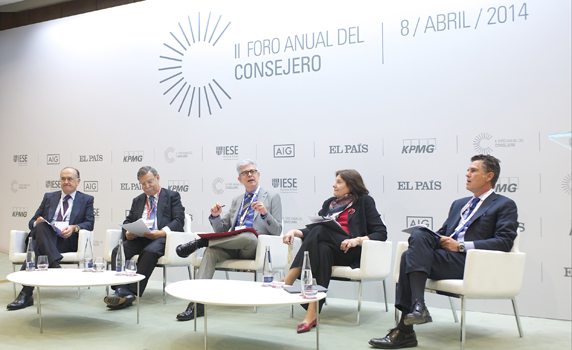
In the current climate of uncertainty and new challenges for business, the role of boards of directors is more important than ever in ensuring that both companies and the economy are competitive. This was one of the focal points at the 2nd Annual Forum of Boards of Directors organized by IESE along with KPMG, El País and AIG. More than 150 people took part in the debate that covered the new demands on corporate governance and the challenges that companies’ organs of government face.
“Boards of directors should decide the course that a company should follow and make sure that it’s the right one. However, this job is becoming increasingly complex due to economic, regulatory, technological and social changes which are forcing boards of directors to adapt themselves to new challenges,” said John Scott, president of KPMG in Spain.
Board members “contribute to the strategic management of companies and bring security and trust to both investors and society in general,” said Scott, who added that an overwhelming majority of board members were in favor of better communication and more transparency in regard to managing risk.
IESE Prof. Francisco Iniesta pointed out that the quality of boards of directors depended on their members. “And the quality of the directors depends on the quality of the people,” he added.
“Everything begins and ends with the quality of the directors and their advice,” said Juan Béjar, CEO of FCC. He believes that the selection process of board members is key. “This is an aspect that could be improved,” he said.
Something else that could be improved is the quality of the information that the board receives which, in his opinion, too often leaves much to be desired. Béjar emphasized the need for the board’s decision making to be grounded in “real debates” within the company in order to make the business stronger.
Compensation policy
Fernando Córdoba, head of HR at NH Hotels, said compensation policy should be linked to the company’s sustainability over the short and medium term. Jaime Sol, a partner at KPMG Lawyers, agreed, saying that the compensation system for senior executives should be adapted to the size and strategy of the company. “Board members shouldn’t be paid if the company has bad financial results,” he said.
“Becoming a board member shouldn’t be seen as a prize but rather a profession. Being a board member is a profession,” said the lawyer Joaquín Uriach. According to him, companies should draw up a list of requisites for becoming a member of the board. “It’s essential to demand that board members do things well, but they behaved with honesty and understand the companies they are involved in,” he said.
Álvaro Mengotti, director general of AIG, said that board members needed to catch up with technology and globalization.
Committed investors
Giulio Pediconi, managing director of Sodali, said that investors increasingly want to know how the board of directors reaches decisions and how they add value to the company. The most committed investors are those that take a long-term view of the company. These people take an interest in the make up of the board of directors and questions related to their remuneration, not just the quantity but the quality. “It’s important that the interests of the board and investors are in alignment,” said Pediconi.
Susana Peñarrubia, of Deutsche Bank, reiterated that companies should take seriously their stakeholders in various interests.
“It’s noticeable how few board members resign,” added Prof. Pablo Fernández with a touch of irony. “If one feels oneself to be the custodian of a company one acts more carefully than if one is an investor,” added Prof. Josep Tàpies.
“Companies need to give their investors trustworthy and intelligible information. If the investors understand it, that will help the company to grow in the medium and long-term,” said Paul Druckman, CEO of International Integrated Reporting Council. Druckman criticized the short-termism of many investors. “Many of them talk too much but don’t set an example. They need to have their feet on the ground because things are changing,” he said.